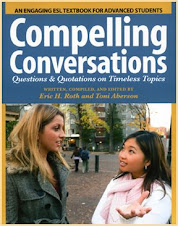Friday, September 18, 2009
What Do Your ESL Students Believe? Find Out!
What are your core beliefs? More importantly, what are the core beliefs of your English students? How do you know? Do you like listening to quality radio essays to improve listening skills and critical thinking skills? Are you looking for a friendly way to gently nudge your EFL students into reflecting on their experiences and expressing their ideas?
If so, you might want to consider adding This I Believe radio essays to your curriculum. This I Believe, originally a radio program hosted by legendary journalist Edward R. Murrow in the 1950s, has been resurrected by National Public Radio as a weekly feature.
While the 1950s version sought out short personal essays by leading intellectuals, artists, and prominent personalities, the 21st century version is far more democratic. Anybody can submit an essay – and thousands and thousands of individuals around the world – have.
English teachers and global travelers might appreciate the sample podcast This I Believe: Inviting the World to Dinner by travel writer and Parisian resident Jim Haynes. Students might also appreciate the open spirit and generosity, but if not, they can choose from over 200 other radio essays. In short, The This I Believe website includes a tremendous amount of free resources for teachers and students. Teachers can sign up for the free mailing list and download an exceptional discussion guide. Amazon also sells several collections of This I Believe essays from both the modern version (with audio) and the original collections from over 50 years ago.
Why don’t you try it in your English class? Here is a simple reproducible homework worksheet that allows English students to find, summarize, and share their own favorite podcasts. I usually have students “introduce” their choice in both small groups and before the entire class. After students have listened to several “this I believe” radio essays, they feel more comfortable writing their essay and presenting it before the class for a final project.
So far, my intermediate and advanced students have both enjoyed the assignment and produced original, reflective work. The flexible format also means that English teachers can modify it to meet student or course requirements. Writing instructors can ask for essays; speech instructors can require a speech. Yet students get an often rare chance to hear intelligent voices reveal their personal philosophies in an engaging manner. Further, our students get to speak their minds and share their insights in our strange, wonderful language. I believe that makes a compelling English class too!
As Mr. Murrow would say, “good night and good luck.”
-------------------------------------------------------------------------------
This I Believe Homework Worksheet
Links: This I Believe
http://www.npr.org/templates/story/story.php?storyId=4538138
Please select one radio segment, based on a personal essay, and read by writers. Find a story that resonates with you. Listen carefully. Take notes. Fill out the worksheet below. You will be asked to share your selection with classmates in both a small group and the entire class.
Student:
This I Believe Title:
Author/Reader:
Length:
Who is the author?
What’s the main idea?
Why did you choose this podcast?
Did you hear any new words or phrases?
1.
2.
3.
Who do you imagine is the audience for this podcast? Why?
What is your reaction? Why?
-------------------------------------------------------------------------------------
Ask more. Know more. Share more.
Create Compelling Conversations.
Visit www.CompellingConversations.com
Saturday, April 18, 2009
Welcome To Compelling Conversations for ESL/EFL Teachers
Volume 1: Issue 1
This issue has been long overdue, and for our first 2009 issue, we would like to personally thank you for subscribing to our newsletter for English teachers. We appreciate your visit to our website and, for this reason, we have good news:
A discount coupon for our book! If you've haven't had the opportunity to get a copy of our book, we have lowered the price for our subscribers: you can get $5 off the regular price for Compelling Conversations: Questions and Quotations on Timeless Topics (for ESL learners and teachers)! Click here to get your copy for $15 (instead of $20).
Or just download our free Compelling Conversations chapters on Change and on Job Interviews.
Don't forget to check out our special thank you offer again at the end of this newsletter.
| In This Issue Articles of Interest The Compelling Conversations Blog recently had a post on World Englishes, which linked to a review on a book by the same name. In this newsletter you will find an intro to Eric Roth's review (to the right), and for the sake of providing different perspectives on the subject matter, here are a few articles that have caught our attention.
The radio program This I Believe was also reviewed on the Compelling Conversations Blog. We offer an assignment/worksheet on the post, and you will find an intro and direct link on the right. | World Englishes Review by Eric Roth Do the English in England speak the same English as the Americans, the Jamaicans, the South Africans, the Australians, the Irish, and the Indians? Do they even speak the same English as they did 100 years ago before radio, television, and the internet? Should there be a global standard for all English speakers? Linguist Andy Kirkpatrick raises these and many other provocative questions in his exceptionally documented book “World Englishes: Implications for International Communication and English Language Teaching” published by Cambridge University Press. Read more » This I Believe Tuesday, March 24, 2009 What are your core beliefs? More importantly, what are your students’ core beliefs? How can you help English language learners improve their listening skills while exploring their own personal philosophy? Do you use radio podcasts in your English classrooms or ask students to write personal essays? If so, you might want to visit www.ThisIBelieve.org for excellent, fascinating authentic listening materials. Read more » |
Speaking of radio programs, do you like podcasts? VOA News makes Special English podcasts; check out Baseball Terms: This Is a Whole New Ballgame!
Vietnam Embraces English Classes - and Looks for Communicative English Teachers By the way, the Compelling Conversations Blog will be getting a make-over! Yes, we'll soon be incorporating more digital media, changing our theme, and we'll be making it easier for you to get a copy of our class worksheets. We want to move beyond mere text and incorporate more pictures and sound to create a livelier, more 21st century look. Again, as a newsletter subscriber, you qualify for a $5 discount on our downloadable ESL ebook that makes teaching conversation in English class a simple joy. Why not buy your copy today? Click here for your copy of Compelling Conversations: Questions and Quotations on Timeless Topics (for ESL learners and teachers) for $15 (instead of $20)! |
Ask more. Know more. Share more.
Create Compelling Conversations.
Visit www.CompellingConversations.com
Monday, March 23, 2009
More Practical Tips to Help English Students Ace the Job Interview
Here is an excellent, concise list of simple practical steps for English language learners to take when preparing for a job interview - and a few post-interview suggestions worth noting. The fine article comes from the Q Blog for English language learners. It's a fine resource. Check it out.
Official Q Blog: How to Succeed in an Interview
Ask more. Know more. Share more.
Create Compelling Conversations.
Visit www.CompellingConversations.com
Monday, March 2, 2009
What Does the English Teacher Do While ESL Students Converse?
Many English teachers, especially novice ESL instructors, talk more than ideal - and allow their English students to talk too little. Ironically, many ESL instructors make this “good mistake” because they are so dedicated. What, after all, are English teachers supposed to do while students exchange ideas and practice their speaking skills?
Listen. Take notes. Politely, and indirectly, correct by modeling better speech. Sometimes, for brief periods, join in the student conversations. Listen. Ask questions. Take notes. Repeat.
When I taught an advanced ESL conversation class to immigrants and international students from many different countries at Santa Monica Community College, I developed a little routine for the popular two-hour class.
First, I introduced conversation topics with a quotation or proverb and briefly introduce the day’s topic. Then I distribute worksheets (which became chapters in Compelling Conversations) with 30 or so questions, 10 or 12 key vocabulary words, and a few selected quotations or proverbs. Then students would be paired up to interview each other and share experiences for 20-30 minutes.
What did I do? I simply circled around the room, briefly joining in conversations, taking notes, and indirectly correcting students by modeling a better way to ask or respond to questions. I also jotted down key comments and “good mistakes” - both grammar and pronunciation - that I would later share with the entire class. Further, I focused on the content of student comments so fluency and meaning was more important than accuracy. Ideas and perceptions mattered more than perfect grammar.
These notes, however, helped me guide the classroom discussion because it closely echoed their previous conversations. It also lead to dynamic discussions because several perspectives were acknowledged and considered. Discussions were usually for another 20-30 minutes.
Taking notes also gave me a chance to emphasize certain sound groups or related word forms. While the students were talking to each other, I was playing reporter and taking notes. This group activity would often take another 10-15 minutes. Class ended with everyone asking a question on that same topic so they could continue the discussions outside of the classroom.
Here is a reproducible worksheet that captures that process of monitoring conversations and leading discussions. Although designed to be used with Compelling Conversations: Questions and Quotations on Timeless Topics, it can be used for any ESL classroom discussing almost any topic.
—————————————————–
Compelling Conversation Classroom Worksheet for Teachers
Topic:
Pages:
Date:
# of participants:
# of groups:
Class:
Opening Quote:
Opening comments to class:
Starting time for conversations:
Conversation content:
- What did you hear the students say? Summarize.
Follow-up class discussion questions:
Review Vocabulary:
Pronunciation tips:
Grammar issues:
Other comments/observations:
———————————————————
Is this a lesson plan? Sort of, but it's completely responsive to your students' comments, questions, and conversations. You take the "good mistakes" from that day's actual events. Whether you consider this a worksheet or lessonplan, this document has helped me teach and lead many satisfying ESL classes.
As an old American cereal commercial used to say, "try it - you'll like it."
Ask more. Know more. Share more.
Create Compelling Conversations.
Visit www.CompellingConversations.com





